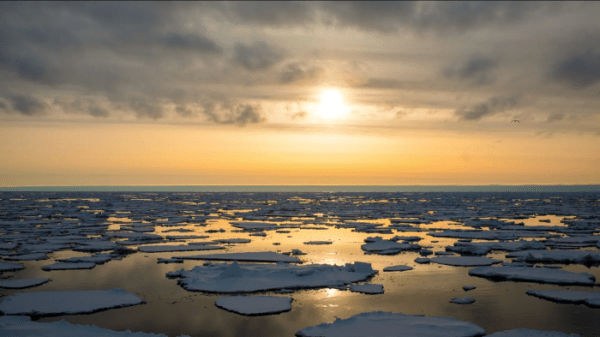Study: Shrinking Sea Ice Means More-Intense Storms on Alaska’s Coast
Sea Environmental Changes Threaten People, Ecosystems
While reliably snow-blanketed holidays might seem a thing of the past in Maryland and other parts of the East Coast—including Boston, which set a record this year for the longest stretch with no major snowfall—a new University of Maryland study reveals a much more urgent winter climate shift in a subpolar region of North America.
In findings published this week in the Journal of Climate, researchers with the Cooperative Institute for Satellite Earth System Studies (CISESS) at the Earth System Science Interdisciplinary Center (ESSIC) identified the Bering Sea in the northern Pacific Ocean as a climate change hotspot, showing how environmental changes there threaten the stability of vulnerable coastal communities and ecosystems.
The research team found that in nine of the last 10 winters, sea ice extent was lower than average, including record lows in 2018 and 2019. During this period of sea ice loss, wind speeds and wave heights increased.
“In the Bering Sea, sea ice acts both to dampen waves as they hit the edge of the ice cover, and also to limit the transfer of energy from winds into the ocean from which waves are generated. In turn, winds and waves can break up sea ice into smaller pieces at the ice edge,” said Reint Fischer, a graduate student in the Department of Atmospheric Sciences (AOSC) and first author of the paper.
Fischer used satellite remote sensing to analyze surface ocean conditions in the Bering Sea, working alongside co-authors Associate Professor Sinead Farrell of AOSC and the Department of Geographical Sciences, ESSIC Senior Faculty Specialist Kyle Duncan and oceanographer John Kuhn of the National Oceanic and Atmospheric Administration.
Less sea ice means less protection for coastal communities, they said.
“If sea ice continues to decline here, then we would expect that the extreme waves we have already observed with our satellite data would have a bigger impact on coastal communities,” said Farrell, who also serves as Fischer’s Ph.D. adviser.
Read more of Cazzy Medley's article in Maryland Today
Photo via jomilo75 on Flickr
Published on Wed, 11/13/2024 - 09:47


